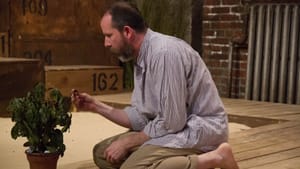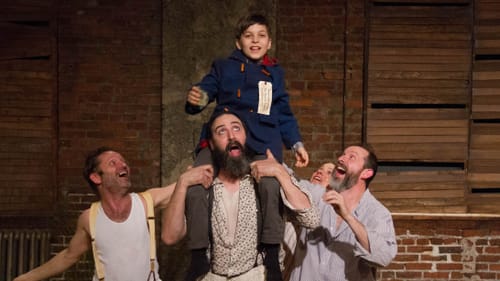Stay in the Loop
BSR publishes on a weekly schedule, with an email newsletter every Wednesday and Thursday morning. There’s no paywall, and subscribing is always free.
Paradise found, then lost
EgoPo Classic Theater presents John Guare's 'Lydie Breeze Part 2: Aipotu'

Aipotu, the title of EgoPo Classic Theater’s second installment of John Guare’s Lydie Breeze trilogy, spells “Utopia” backwards. The sun-washed beaches of Nantucket island serve as the drama’s backdrop and suggest a prime location for the ideal community Lydie and her cohort dreamed up in Cold Harbor, the saga’s opening play.
But Guare clearly wants to tell us something with his unusual title, and director Lane Savadove’s richly detailed production shows how quickly an Eden can go to seed.
American dreamers
Although the play opens seven years and hundreds of miles from the Civil War carnage that defined Cold Harbor, the play’s central quartet don’t seem any happier than they did on the battlefield. Lydie (Melanie Julian) humbles herself working as a nurse for “the enemy” — the wealthy townsfolk, who scorn her bohemian ways — to earn a meager living. Joshua (Charlie DelMarcelle), now her husband, spends nearly a decade writing a sprawling philosophical text, only to have it rejected by eminent editor William Dean Howells.
Kindhearted Amos (Ed Swidey, terrific throughout) has grown disillusioned with communal living; it doesn’t help that Lydie and Joshua treat him like a burden. He sets a path to Harvard Law School as his escape but lacks the money to realize his ambitions. Scheming Dan Grady (David Girard, mercurial and impish) leaves the cooperative to work as a railroad conductor. His occasional returns are complicated by an affair with Lydie, fueling Joshua’s jealousy.
If sweep and grandeur marked Cold Harbor, Aipotu tells a more contained but equally engrossing story. Guare’s keen gift for character development occasionally seemed subjugated to stagecraft in the earlier play; here, he fleshes out the complex interpersonal relationships at the center of the epic.
Nowhere is this more apparent than with Lydie herself — she comes fully into her own as a headstrong, complicated, and fascinating woman who won’t flinch when it comes to her principles. Julian imbues her performance with a level of wit and passion that was missing from her conception of the girlish Lydie of Cold Harbor.

Guare shows the audience how Lydie can feel dissatisfied even when she gets exactly what she claims to want. Her marriage to Joshua is, in many ways, a betrayal of utopian freedom, and DelMarcelle skillfully teases out both his unhappiness within the union and his almost childlike dependence on Lydie. Tension builds through a series of heated arguments between Lydie, Joshua, and Dan, all of which underlie the eventual destruction of their attempt to create an unblemished society.
Waking up
Savadove expertly allows a sense of uneasiness to permeate the play’s lighter moments. Dread creeps into a raucous party thrown on the beach via Mike Inwood’s spectral lighting and whispers of haunted music, played live onstage by Mark Knight, Amanda Jill Robinson, Kristy Joe Slough, Andrew J. Carroll, and Kylie Westerbeck.
Westerbeck doubles as a slightly apparitional version of Gussie, Lydie and Joshua’s infant daughter, who stalks the periphery. It hardly comes as a surprise when paradise falls.
The second act forcefully shifts focus, literally and figuratively: a group of carpenters and stagehands entirely reconfigure Markéta Fantová’s set while the audience enjoys refreshments and a 40-minute musical interlude on the second floor of Christ Church Neighborhood House. (The long intermission, though necessary, does zap some of the play’s momentum). The physical and tonal shift that occurs should not be spoiled — I’ll simply say that it contains Guare’s strongest writing for the trilogy so far.
Aipotu recounts how a paradise found can quickly be lost, and how even the noblest goals can line the garden path to hell. In that respect, Guare continues to give us a uniquely American epic.
What, When, Where
Lydie Breeze, Part 2: Aipotu. By John Guare, Lane Savadove directed. EgoPo Classic Theater. Through March 18, 2018, at the Christ Church Neighborhood House, 20 N. American Street, Philadelphia. (267) 273-1414 or egopo.org.
Sign up for our newsletter
All of the week's new articles, all in one place. Sign up for the free weekly BSR newsletters, and don't miss a conversation.

 Cameron Kelsall
Cameron Kelsall